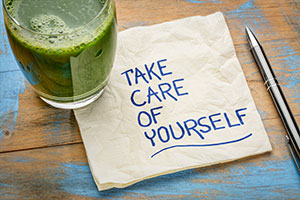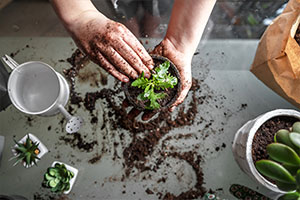Tips for practicing the act of self-care
Daniel Mills-Da'Bell, Head of Clinical Safeguarding at Kooth talks to Farm Diversity about how farmers should be practising self-care and offers his top tips.
Between unpredictable weather, heavy workloads, and financial struggles caused by economic forces beyond individual control, farm life is undeniably stressful. Mental health can sometimes fall to the wayside in the face of other challenges farmers face every day, but managing stress on the farm is just as important as maintaining physical health. In fact, the two are inextricably linked.
The sustainability of farming relies on farmers taking care of their minds as much as their bodies. Among the different assets on the farm, the most important asset is the farmers’ health. Without it, it’s difficult to function on a daily basis, work collaboratively, or maintain business and family relationships.
 To manage stress, the importance of self-care, or activities that rejuvenate mental, physical, and emotional health, cannot be overstated. In spite of this, when we hear the term self-care, people don't typically associate it with farmers. More traditionally, and incorrectly, self-care is associated with a form of pampering, such as bubble baths and cuddling up on the sofa with a tub of ice cream to watch a comfort movie. This is a misconception that can be confusing and can get in the way of actually looking after ourselves in an important, safe, healthy way.
To manage stress, the importance of self-care, or activities that rejuvenate mental, physical, and emotional health, cannot be overstated. In spite of this, when we hear the term self-care, people don't typically associate it with farmers. More traditionally, and incorrectly, self-care is associated with a form of pampering, such as bubble baths and cuddling up on the sofa with a tub of ice cream to watch a comfort movie. This is a misconception that can be confusing and can get in the way of actually looking after ourselves in an important, safe, healthy way.
Social perceptions around self-care may lead many more farmers to reject the need to incorporate it into their lives. In practice, self-care isn’t bubble baths (although, it can work wonders for muscle relaxation after a physically demanding day of work), it’s about looking after your own wellbeing, both in mind and body. Therefore, what it constitutes is dependent on the individual, and what feels right for them.
With this re-definition in mind, there are various sources of personal renewal that can be relevant to you. Here are a few alternative types of self-care that can help you make the most of time away from work:
Sports
One of the best examples of self-care, which many people may not be aware of, is sports, exercise, or movement. From golf to football, sports can help keep us active and fit. Not to mention, there are countless ways that physical exercise has been scientifically proven to boost our mental health in many instances (though this again is individual and may not be helpful for everyone). In addition, team sports can help us to socialise and build stronger bonds, which can be a crucial skill to develop when running a business like a farm. Sports also don’t need to be about exerting a lot of physical energy or about physical health - doing something we enjoy is what is fundamental.
Watching sports
While participating in sports is one way to practice self-care, watching can also serve as an escape from daily stress.
The stimulation of watching your favoured team play causes your brain to release dopamine, the feel-good chemical in our brains, which can have the same effect on us as the thrill of riding a roller coaster (which incidentally might be something else that brings you joy and lowers your stress - theme parks and amusements).
DIY projects
This can range from repairing furniture to making bird feeders. You may find yourself interested in taking up woodworking, or for more of a challenge, metalworking. Maybe working with leather and fabrics is more up your street. It is a stimulating challenge to keep your mind active and thinking and to produce results that you can be proud of, whatever DIY project you choose.
Camping
Since farmers often spend time outside for work, it's only natural they would feel at home in the great outdoors while camping. Camping can be excellent for offering new challenges and experiences that can keep your brain healthy, as they may force you to think for yourself.
If you’re stressed from work at the farm, this may be having an impact on your sleep. It has been found that camping can re-set our biological clocks and help those of us who have trouble falling asleep or waking up in the morning.
Being immersed in wild natural surroundings also releases serotonin, known as the “happy chemical” in your brain.
Reading
The act of reading can be a great way to stimulate the mind and give someone a refreshed perspective on things. Delving into a fantasy universe can be a great way to escape from the real world and become immersed in new adventures, or be an alternative version of playing, or delving into a different narrative, which can include audio books as well as reading. Whatever your preference, fact or fiction, reading can transport us out of our daily grind and into a new realm where nearly anything can feel possible.
Fishing
Many people who fish tend to describe it as a short release to escape and recharge for a couple of hours. For some, it can be the ultimate stress-relieving mechanism; studies have shown that fishing can help increase levels of happiness, self-assuredness, and calmness.
 Gardening
Gardening
There is a strong correlation between happiness and feeling connected to nature. A garden’s therapeutic features, such as water features or fragrant flowers, can allow for a mental escape from any stressors.
With gardening, you'll have a long-term project to be passionate about, separate from all the work of the farm. Additionally, it can enable you to develop skills such as patience, resiliency, and problem-solving.
Socialising
Farming can become isolating, so reaching out to others and investing in those connections can enable us to recharge our batteries and feel more at peace in the world. It can really make a difference knowing there are people out there who want us around, whether to go for a drink at the pub, a walk, or just to spend time together. There are also many options online for starting to think about new social groups or activities, and overcoming a potential first hurdle of just giving it a go and “leaning into your edges” can feel very rewarding (speaking from personal experience of recently starting a Hip Hop dance class for the first time in my life! Which brings so much joy and socialising after a wave of initial worry).
Online Gaming
Although there are lots of perceived negatives attached to gaming perpetuated in the media - addiction, social isolation - this overlooks all the ways that gaming can boost a person’s wellbeing. It can actually aid socialising, as in games like World of Warcraft being a member of a guild can help to establish friendships and bonds with people from all over the world. In moderation, gaming can also stimulate dopamine production and help offer escapism at the end of a hard day’s work.
 Cooking
Cooking
Cooking can be considered self-care at its most basic and nourishing. In addition to feeding both body and soul, cooking can also be a creative outlet.
Developing your skills in the kitchen can bring a sense of accomplishment and mastery, not to mention all the great food you have as a reward at the end. This form of self-care can be especially meaningful if you use ingredients that are the product of your own farm.
These examples are just a few of the countless alternatives to thinking about self-care.
It is possible that you already do these kinds of activities in your personal time without realising that they are a form of caring for yourself. Whether you're enjoying a hobby or socializing with friends, remember that what you're doing could be having a tremendous impact on your wellbeing, and take a moment to appreciate it.
Last but not least, one of the most important aspects of self-care is recognising when you need support. Irrespective of what kind of stress you are going through, it's crucial that you reach out. Access to healthcare can be problematic in rural areas, but there are more and more options for people to get medical assistance using online or more distant sources. For example at Kooth, our services, commissioned by The Royal Agricultural Benevolent Institution (R.A.B.I), are accessible to all farmers and farming family members over the age of 10 with no referrals, waiting lists, or thresholds to meet.
The key to dealing with the challenges of this lifestyle is making managing stress an everyday conversation. In agriculture, it's pretty common for us to talk about health and safety. It's important that we also expand that to talk about mental health.
- Log in to post comments

